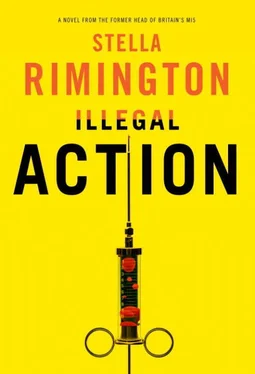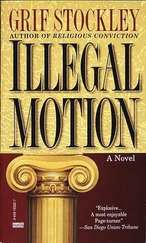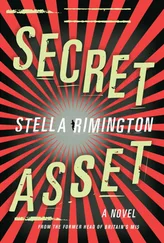“Curtail?” Brunovsky raised an eyebrow. “You mean you want me to shut up.” He laughed but his eyes were steely.
“We thought,” said Pennington, moving on hastily, “that you might want to take extra security measures, or have us take them for you.”
“I have a bodyguard already. From one of your country’s most reputable firms. I don’t need another one.”
Liz looked at Pennington, as if to say, now what? He was looking at Brunovsky, with the sympathetic expression of a parent counselling a wayward child. “I can certainly understand that,” he said carefully. “But perhaps there’s an alternative.”
Like what? thought Liz, suddenly alert.
“Perhaps we could assign someone to…,” Pennington paused, searching for the right phrase, “be around. Someone who wouldn’t get in the way, but who would keep an eye open on your behalf, be able to recognise if there was anything to be concerned about and be in a position to… respond if you needed any kind of help.”
Brunovsky looked puzzled. “Would this person be armed?”
“No,” said Liz quickly, wondering what the hell Pennington was talking about. He now also shook his head, but rather more slowly.
“What are we talking about then?” asked the Russian, sounding puzzled.
Don’t ask me, thought Liz, still mystified. She was going to have to speak to Brian Ackers right away, she decided.
Pennington spoke more slowly, almost ponderously, as if this would somehow give greater weight to his words, “Let’s just say it would be someone very experienced in recognising and handling potentially threatening situations.”
“Aha,” Brunovsky said with sudden enlightenment. “Someone from your famous intelligence agencies.” When Pennington didn’t react, the Russian scratched his head and seemed to think about this. Suddenly he gave a sharp nod of assent. “I like that. I like that very much.”
“Why don’t you think it over?” said Liz, infuriated by what was happening and trying to leave space for the withdrawal of Pennington’s impulsive offer.
“Okay,” said Brunovsky, but before Liz could relax he pointed at Pennington. “I will telephone you tomorrow.”
As they said their goodbyes Liz just managed to contain her anger but when the door closed behind them and they descended to the pavement, she rounded fiercely on the Foreign Office official. “What on earth was that about?” she demanded.
“I don’t know what you mean,” said Pennington. He refused to meet her stare, making a show of looking around for a taxi.
“You know perfectly well this isn’t something for the intelligence services. If Brunovsky’s in danger, he needs protection from Special Branch, not a babysitter from Thames House.”
“You saw yourself he wasn’t keen on having another bodyguard.”
“Then you should have insisted. You can’t just offer MI5’s services.”
A taxi braked sharply and its window descended. Pennington leant in to speak to the driver as Liz opened the back door, determined to continue the argument on the way back to Westminster. “Sorry,” said Pennington, still avoiding Liz’s eyes. “You’ll have to get another cab. I’m going the other way.”
As he drove off, Liz stared after him with unconcealed fury. Wait until Ackers hears what you’ve done, she thought, starting to walk towards Green Park Underground station. He’ll have an absolute fit.
But it was Liz who almost had the fit. “I’m supposed to be what ?” she demanded. Outside, low cloud piled up like dark balls of wool. It had been threatening to rain all day.
“Considering Brunovsky’s art interests, it seemed apt. We couldn’t have you posing as a platinum expert, could we?”
“I’d rather not be posing as anything, thank you very much. The whole thing’s preposterous.”
Ackers looked taken aback, and fidgeted uncomfortably in his chair. Liz realised he was unused to his staff arguing back. Hadley, his right-hand man, was a classic yes-man; sometimes it seemed he even yawned at the same time Ackers did. Liz sensed that her boss wasn’t altogether happy with the new blood that had arrived in his department almost simultaneously: Michael Fane, Peggy Kinsolving and Liz—especially Liz. She looked at Brian and could see him thinking, “Difficult woman.”
He said reluctantly, “If you must know, Brunovsky himself asked for you.”
“Am I supposed to be flattered?”
Brian didn’t reply so Liz continued, “And you say I’m going to pretend to be a ‘mature student’ who’s studying Pashko?”
“Yes. That was also Brunovsky’s idea.”
“Brian,” she said patiently, trying not to show her annoyance, “I read history at university, art history only just came into it. When Nikita Brunovsky showed me the painting he’s planning to buy at Northam’s I could no more have told you who painted it than I can tell you how to make a nuclear bomb.”
“We thought as much,” Brian said, and Liz wondered who this “we” was. Geoffrey Fane, doubtless. “It’s been decided you should have a quick brush-up on art history, and some intensive tutorials into this Pashko.” He enunciated the name carefully. “You’re not going to be posing as an expert, never fear. Just an enthusiast—someone doing a diploma or whatever, who’s writing a short thesis about him. Only what’s needed to justify your presence in Brunovsky’s household.”
“Where am I going to have these intensive tutorials? At the Courtauld?” she added, unable to suppress her sarcasm.
“No,” said Brian measuredly. “But it’s probably just as good. You’re to spend a week in Cambridge. There’s a woman there, a don at Newnham, though I gather she’s retired. She is an expert on Pashko.” He added as an afterthought, “And she’s a Russian.”
“Whose idea was this?” asked Liz, thinking, I bet it’s bloody Geoffrey Fane again. She glanced out towards the Thames and noticed that the first spits of rain were streaking the windows.
• • •
Liz was still fuming as she left Thames House to go home. Her mood was not helped by the rain, by now sheeting down and being blown erratically sideways by a gusty westerly wind. The umbrella her mother had given her last Christmas, while handily compact when folded in her handbag, was completely useless against these conditions. By the time she got to Westminster Tube station she was soaked from head to toe and her navy blue suede shoes, chosen more for visiting Brunovsky than for wet pavement walking, were squelching hopelessly.
The rain had let up a bit by the time she emerged from the Underground system, still soaking wet, at Kentish Town and she wondered briefly whether to ring Dave Armstrong, her old colleague and friend from Counter-Terrorist days, and entice him out for a pizza and a moan about Brian Ackers. But remembering this was one of Piet’s weekends, she decided instead to stop at the Threshers wine shop, open late as usual on a Thursday, and indulge herself with a bottle of the New Zealand Sauvignon they kept in their fridge, and a hot bath, before tidying up the flat.
As she opened the front door she saw the flashing red light of her answerphone reflected in the glass pane. Mother, she thought guiltily. She had been meaning to ring her for days, but hadn’t. Ever since her father had died, Liz had felt responsible for her mother. Not enough to persuade her to agree to give up her “dangerous” job and her life in the “squalor” of Kentish Town and come back home to share the running of the garden centre and marry a nice steady young man. But enough to make her drive the long journey down to Wiltshire every month and to keep regularly in touch by phone.
Читать дальше












